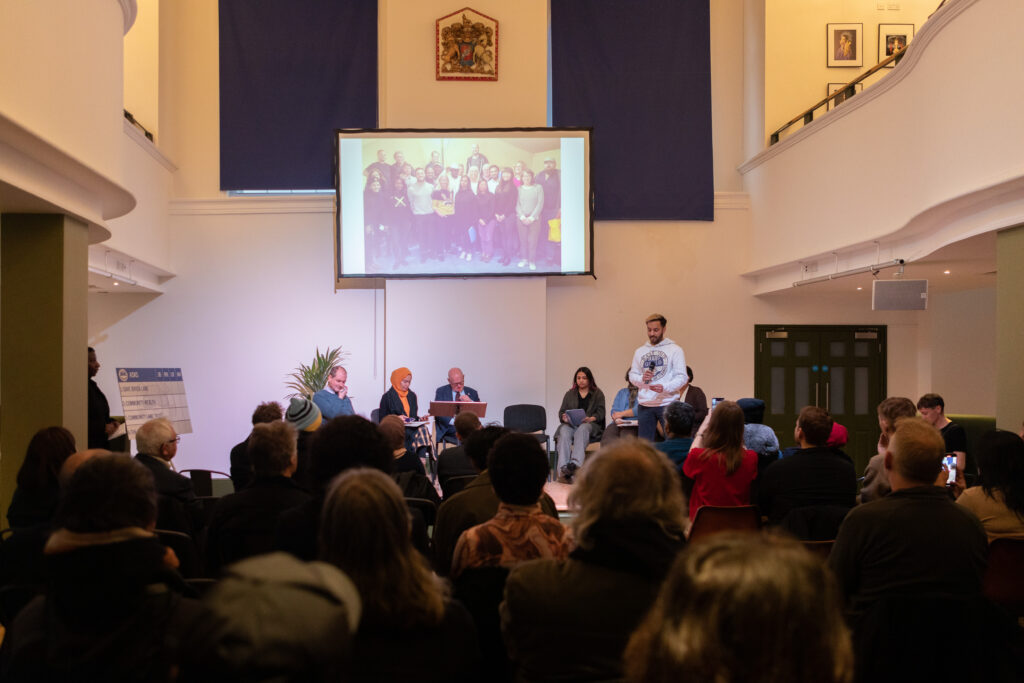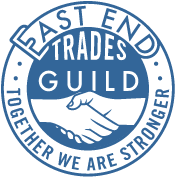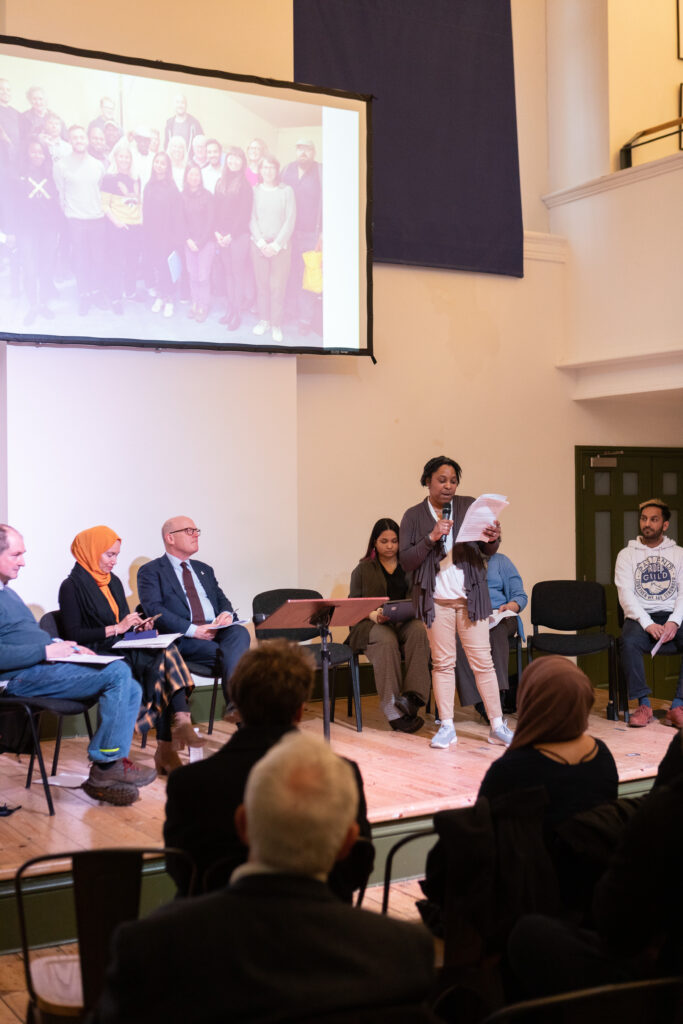EETG Mayoral Accountability Assembly – Your Vote Your Voice!
Blog by Krissie Nicolson, EETG Director. Vast thanks to members Onega who filmed our event and to Rachel Ferriman who photographed it.
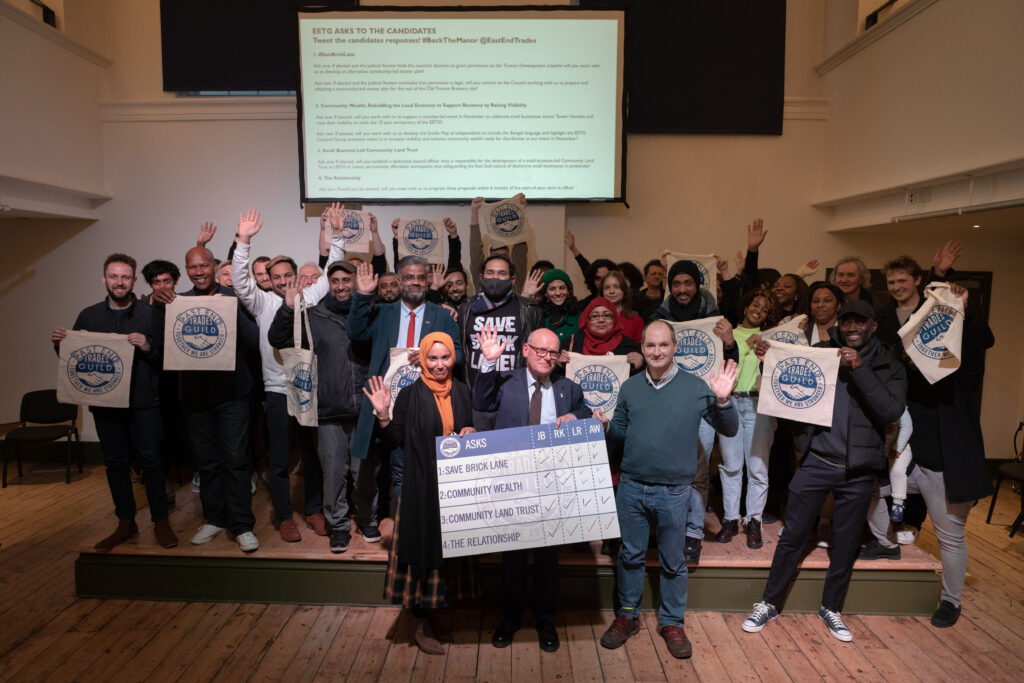
The East End Trades Guild is building the collective strength and voice of small-scale enterprises to act together for the common good of local neighborhoods. By bringing together small and micro-enterprises that are the lifeblood of communities we take action on shared interests which is critical for London’s recovery from the pandemic.
In a non-partisan Community Organising tradition, the Guild held a Mayoral Accountability Assembly last week. Isn’t that just a Hustings you might ask? Well no, not quite. Hustings play a vital role in democracy but our approach is a little different. Because I am a trained Community Organiser we aim to follow an adapted version of the Citizens UK model of Accountability Assemblies. Hustings are open for anyone to attend, all candidates standing for election will be invited and questions are taken indiscriminately from the floor.
An assembly is private and by invitation only, proposals for the candidates have been worked up through a process of listening and engagement with members and partners. A power analysis is undertaken in order to invite the candidates most likely to win. This approach means that time is distributed more in favour of the voice of the Guild. Conversely, at a hustings, candidates tend to dominate the airtime. For our Tower Hamlets event, we worked with a team of member leaders and our proposals were rooted in the common themes to arise from listening to members both before and during the pandemic.
Our member leadership team for this action in Tower Hamlets was Qusai Jafferji – Newmans Stationery, Maher Anjum – Oitij-Jo Collective, Henrietta Cyrille – The Power of Talk, Doris Kobehi – Fraizup, and Tasnima Uddin – Nijjor Manush
Listening to members uncovered the most pressing common issues and identified the following common priorities;
- Commercial Rent
- Community Wealth & Rebuilding the Local Economy
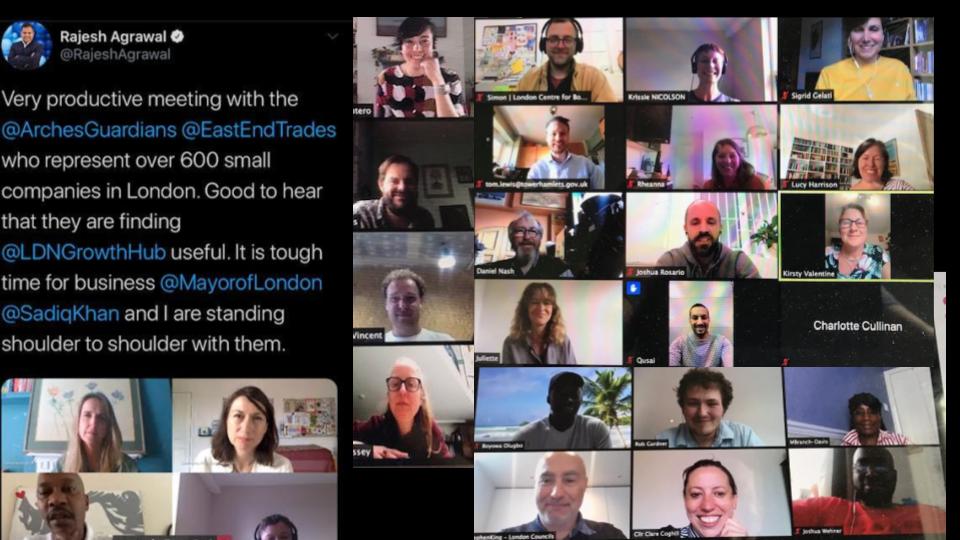
In the second year of the pandemic, we collectively took action on rent, by securing a roundtable discussion with the Mayor of London who committed to working with us on our Community Land Trust initiative. We also requested a meeting with Shaun Bailey. The conservative candidate was coming a close second in the polls. He did not respond to our request.
During lockdowns, the Guild encouraged members to work together where they shared the same landlords so that they might better negotiate collectively and support each other while they were forced to close by the Government. We discovered that all four of the tenant groups with private landlords owning multiple units are registered in offshore tax havens. This would make sense given that 42,500 properties in London alone are registered offshore.
While the Guild does not have any members within the Truman Brewery small businesses might not be aware that according to the Jersey Financial Services Commission, Truman Estates Ltd is registered in Jersey, and £10.8 million left the UK economy via the company in 2020 alone.
This is one of the reasons why the Guild became one of the seven organisations to join a coalition to Save Brick Lane. The East End culture of migrant, working-class, and independent small businesses has been relentlessly exploited and commodified, deepening the polarity between rich and poor in perhaps the most unequal place in the UK.
East London is host to the most diverse and poorest boroughs in the country which are directly adjacent to the two most powerful global financial districts of Canary Wharf and the City of London. It’s no coincidence that the hard-earned community wealth created by local entrepreneurs has been sucked out of local communities into global monopolies and offshore property companies.
We urgently need to take the long view by removing land from speculation and anchoring it in the hands of community stewardship for the benefit of the local economy for a sustainable recovery with people not profit at its heart. The Guild’s small business-led community land trust ambition is the antidote to the extractive nature of the property sector because community ownership of land is the most sustainable solution to the rent crisis.
Small businesses and social enterprises can determine their own rent levels based on the Guilds London Working Rent research in place of the status quo where rent is set on what an inflated and manipulated market dictates. A long-term solution requires long-term commitment and we know that this endeavor will not be an easy quick fix.
Through an accountable relationship with Sadiq Khan and with borough leaders from Tower Hamlets, Waltham Forest, and Hackney, we aim to achieve the first small business-led community land trust in the UK. This project will be an exemplar linked to the wider movement for the global Solidarity Economy, an opportunity to test and learn from initiating the first small business-led CLT that genuinely involves local people through a democratic Community Organising practice that focuses on leadership development as well as achieving the collective ownership of an asset.
As David Harvey sets out in The Art of Rent: ‘…no alternative to the contemporary form of globalization will be delivered to us from on high. It will have to come from within multiple local spaces conjoining into a broader movement.’
Are You Registered to Vote?
The deadline to vote in the local elections is tonight! We will never tell you who to vote for, we hope you will consider the responses from the candidates to our proposals and make an informed choice. If you moved recently you will need to register again here: https://www.gov.uk/register-to-vote
If you are not sure if you are eligible to vote you can check here: https://www.electoralcommission.org.uk/i-am-a/voter
We invited Lutfur Rahman from Aspire to our assembly but he could not attend due to ‘unforeseen circumstances.’ Our partners with Save Brick Lane suggested that the Independent candidate Andrew Wood could come in his place because of his planning knowledge. Due to the Iftar falling at 7.41pm, there was no time on the agenda for more than 3 candidates. Below are excerpts of verbatim responses from each candidate in alphabetical order including Lutfur Rahman’s Written responses.
1. Save Brick Lane. Proposals put forward by Tasnima Uddin, Co-Founder of Nijjor Manush.
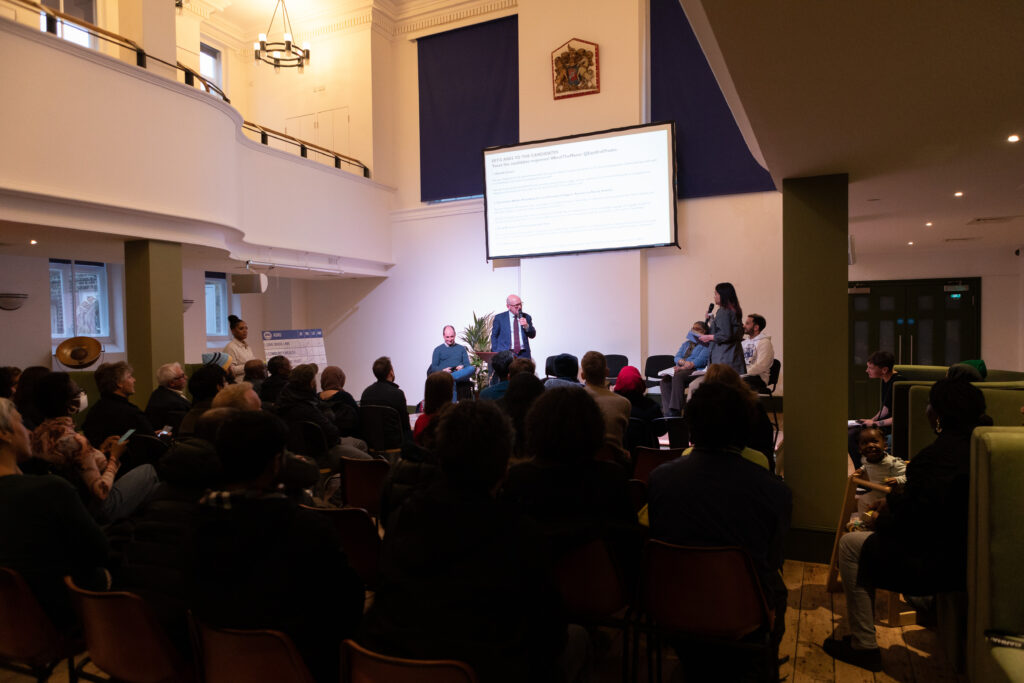
Ask one: If elected and the Judicial Review finds the council’s decision to grant permission to the Truman Development unlawful will you work with us to develop an alternative community-led master plan?
JB: I know that affordability is a massive issue in our borough, places used to be dirt cheap, you used to be able to get a lock-up shop for almost nothing and do a low-profit community-focused business, and nowadays it’s just so difficult. I’d like to look at that, I’m a Labour and Coop Candidate I’d like to see how we can make that work. The answer I have given you can be taken as a yes.
RK: Yes absolutely. And I will tell you why, because the Whitechapel Vision masterplan, was a document that I led on. You need to be involved, you need to shape it. It can’t just be the council officers, it can’t just be me. Your voices are fundamental in the way we shape this area because it is your area you live here own businesses, you have what is called a community invested interest. I’m proud to be Bangladeshi. I came to the county in 1975. When I see that diverse communities have been forgotten in Brick Lane, that is my passion and I want to see them in the master plan.
LR: Brick Lane is a triumph of community cohesion with an international reputation for its food.
Thatʼs why I was horrified by the plans to “redevelop” the Truman Brewery, the lynchpin of Brick Lane, into a shopping mall with corporate offices. As Mayor, I intend to challenge this and will work tirelessly to find a better use for this site. Not only will I do this, but I pledge to review the entire practice of sham “consultation”, in which decisions are simply sent by council leaders for a rubber stamp.
AW: I’m going to be controversial and say no I’m not going to help you produce a master plan. Let me explain why; the term Master Plan has no meaning in the legal planning process. Either you write a neighbourhood plan because that has legal weight in the planning system. Or the council writes a new local plan and you adopt a policy within that. The third thing that the council could do is write supplementary planning Guidance but that does not have as much weight as a local plan or a neighbourhood plan. So yes I would help you do all of that stuff.
Ask two: If elected and the Judicial Review concluded that permission is legal, will you commit to the Council preparing and adopting a community-led master plan for the rest of the Old Truman Brewery site?
JB: Yes, I would like to say yes to that as well. The community needs to have ownership of what happens in our area. I’d like us to have community ownership of a local plan for the area. We have an issue with affordability, we already have an affordable workspace policy in our local plan, I’m not satisfied it’s working exactly as I’d like it to and I’d like to work further on the evidence. For clarity, the answer to your question is yes.
RK: Yes I absolutely commit to making sure that if the JR is upheld we will work together to best represent what you want, to best represent your concerns and your needs.
LR: Yes. Brick Lane and the Truman Brewery have always adapted to meet residentʼs needs, I know that they can do so again. Brick Lane is more than just an old road. It is a hub of culture, community, and local business. Markets in Brick Lane have been around for hundreds of years and have evolved and adapted to the changing faces of East London in that time.
2. Community Wealth; Rebuilding the Local Economy to Support Recovery by Raising Visibility asks from Henrietta Cyrille – The Power of Talk.
Ask one: If elected, will you work with us to support a member-led event in November to celebrate small businesses across Tower Hamlets and raise their visibility to mark the 10 year anniversary of the EETG?
JB: Yes I would like to do that. That is a yes. Big business has got a very powerful voice. They can afford swish PR companies and we can have a strong voice for local small businesses as well. Small businesses have been one of the ways local people have prospered in the East End.
RK: Absolutely. If I am not elected I hope that you will invite me, as I believe I can give you support to make sure you are visible. As a councilor for 12 years much of my casework is related to small and micro-businesses. Over 90% of businesses in the borough have 50 or fewer employees; they should not be forgotten just because we have the large corporates here as well.
LR: Yes. One of the core virtues of small businesses is that they give back more to their community. Instead of extracting profits and funneling them offshore or elsewhere, small businesses put their earnings back into the community. Investment in local business means investing in our community itself.
AW: Having said no earlier I will definitely say yes this time.
Ask two: If elected, will you work with us to develop the Guilds Map of independents to include the Bengali language and highlight the EETG Cultural Group presence within it to increase visibility and enhance community wealth ready for distribution at our event in November?
JB: Yes we have worked on your map before we need to make sure we include diverse businesses.
RK: I agree to that completely and I do think we should be celebrating the vibrant diversity not only the Bengali language, we should include all the languages, we speak over 90 languages in this borough. Why shouldn’t we celebrate that through businesses celebrating the suppliers and the products that you have?
LR: Yes. As your mayor, I will back small businesses and champion our heritage. It is a tragedy that we have lost the Tower Hamlets Community Language Service due to financial cuts and my administration will find a way to restore mother-tongue teaching in Tower Hamlets.
AW: Yes, one of the things I think could be really improved is maps and knowledge of what happens locally.
3. Community Land Trust proposed by Maher Anjum – Oitij-Jo Collective
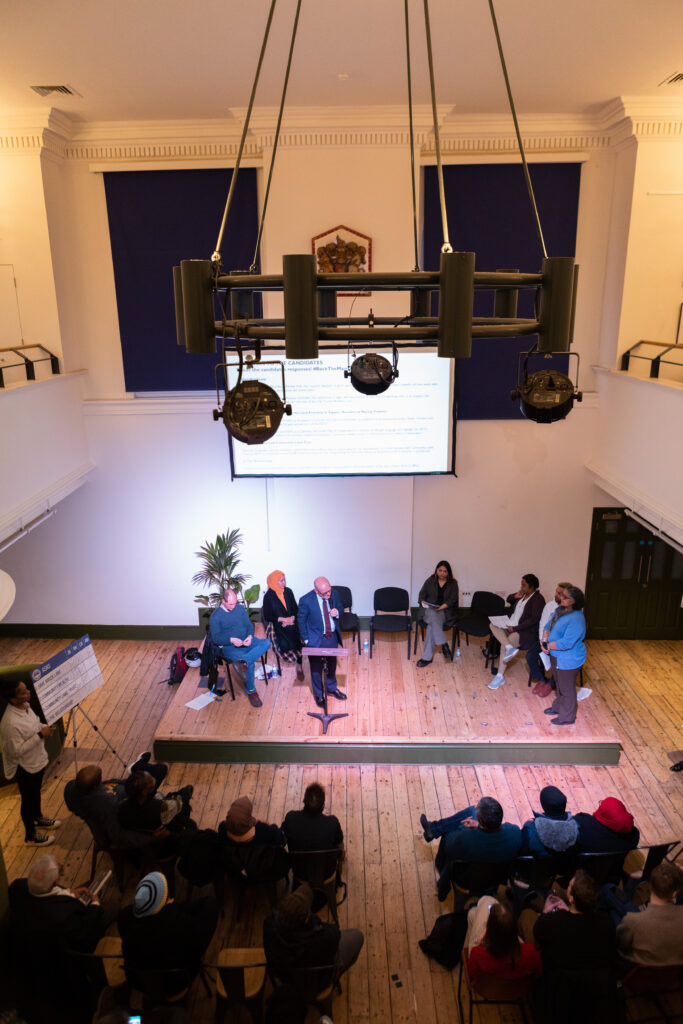
Ask one: If elected, will you establish a dedicated council officer who is responsible for the development of a small business-led Community Land Trust in LBTH to create permanently affordable workspaces thus safeguarding the East End culture of distinctive small businesses in perpetuity?
JB: The first CLT for housing is the one St Clements Hospital in Mile End. If we can extend that model to CLTs for employment which happens in other parts of the world then that’s a good thing to do. We need to provide opportunities for people to get workshops and affordable entry points which help them to set up businesses. That is a yes.
RK: One of the things I have pushed the council on is to make sure there is a dedicated council officer to respond to leaseholders as we have the highest number of high-rise towers in the UK. I may be the only female opposition candidate but I do have a very loud voice in the council and I always stand up for the community. I agree with you on having a dedicated officer.
LR: Yes. I know that costs are rising across the board. Businesses have been hit hard by rising rents, energy costs, and supply line issues. As Mayor, I want to push back against the attack on small businesses and defend our economic and cultural legacies.
AW: I was already planning to add extra resources to help work with local people on things like neighbourhood plans and also assets of community value. People come to me a lot because they know I know a lot about planning. I have been really interested in the CLT model on the residential side and until this evening I’d never thought about it on the small business side but actually, it makes complete sense as well so yes that’s definitely something I will be supporting.
All four candidates agreed to meet with us to further these proposals within 6 months of the start of their term.
The real work will be holding political leaders to account in the weeks ahead. You can help by joining the Guild for as little as £60 a year. Members give us power and legitimacy only by growing ur membership can we see these proposals through! The only criteria are that you are small and therefore have under 50 employees. You don’t need to be a bricks and mortar business and you can be self-employed or a not-for-profit and still eligible. Join here today!
With your help look forward to an accountable relationship with the next Mayor of Tower Hamlets and the Mayor of London.
